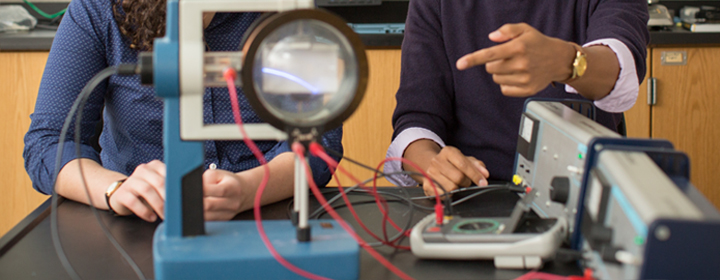
Physics Program
Physics
Bachelor of Science
As the most fundamental of the sciences, physics will amaze you, expand your mind, and prepare you for a surprising variety of occupations. This highly flexible major can take you in a direction that fits your interests.
In KU’s on-campus observatory, planetarium, and physics laboratories you’ll apply theoretical knowledge from your classes to create your own projects, using sophisticated technology to study motion, astronomy,
Your hands-on guided learning can prepare you for careers as varied as R&D in industry and government, data analytics, national security, secondary school teaching, computer programming, and many other technology careers. Kutztown graduates work in the fields of telecommunications or electronics, as well as earning graduate degrees in physics, engineering,
Department of Physical Sciences faculty-guided student research explores areas as diverse as:
- Astrophysics
- Atomic, Molecular, and Optical Physics
- Nanoscale and Mesoscopic Physics
- Optics
- Statistical Physics
- String Theory
The minor in physics can be completed in combination with any other major degree program by taking 20 semester hours of physics courses.
Additionally, Kutztown University offers a Bachelor of Science in Secondary Education in Physics or Physics and Mathematics.
For more information on
Program Checksheets
Sample Career Options
- Accelerator Operator
- Data Analyst
- High School Physics Teacher
- IT Consultant
- Lab Technician
- Research Associate
- Software Developer
- Systems Analyst
- Web Developer
Student Learning Outcomes
- Physics (BS)
- Teacher Certification Programs (B.S.Ed) (includes Elementary Education, Secondary Education and Special Education programs)






